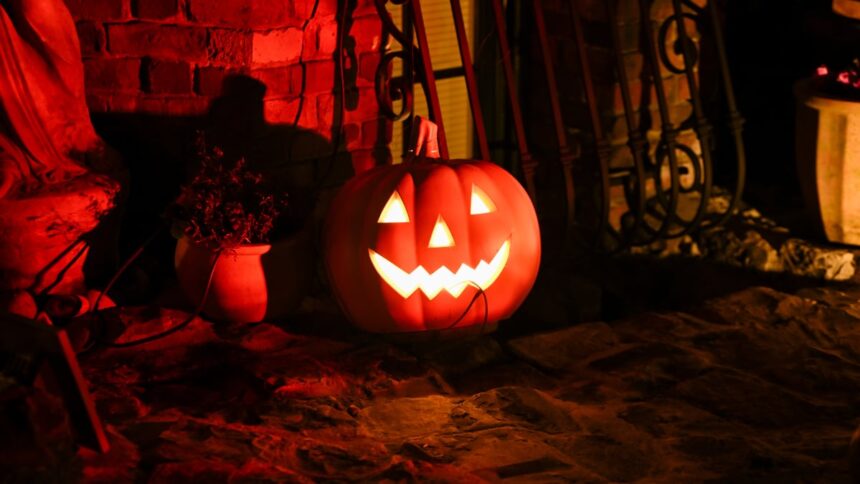“`html

As All Hallow’s Eve approaches, an unexpected debate has emerged this year regarding the ideal timing for celebrating Hallo-weekend. Should it be last weekend or this upcoming one?
While some revelers are still recovering from last weekend’s festivities, others are gearing up for their own celebrations later this week. This year’s Halloween has already inspired a plethora of creative and outrageous costumes, nostalgic nods to childhood memories, and trending challenges on TikTok. Although many costumes reflect today’s more cautious social media practices, there remains a bold push against traditional boundaries of appropriateness during the holiday.
Halloween Google Doodle game lets you battle ghosts as an adorable magical cat
The Rise of Niche Costumes and Memes
Niche themes and costume tributes to cultural phenomena have made it clear: generic outfits are out of style while unique costumes take center stage. The modern Halloween experience is all about embracing humor and irony, whether one likes it or not.
This year’s most popular memes—like “sad ant” and “she’s so crazzzzzzy“—made memorable appearances at parties. Additionally, viral posts such as “he wants that cookie so badly!” were creatively transformed into couple’s costumes.
The humorous trend dubbed “I hate gay Halloween” made its return with even more eccentric outfits than last year’s quirky selections. Perhaps you came across the viral video featuring a group of children dressed as French music icon Serge Gainsbourg? Or maybe you noticed someone donning the attire of a sorrowful Oompa Loompa from the infamous “Willy’s Chocolate Experience”? And let’s not forget those who channeled horses from Beyoncé’s iconic album covers!
“““html
The iconic carousel horse featured in Florence Pugh and Andrew Garfield’s We Live in Time has sparked a wave of creativity online.
A Surge of DIY Creativity Among Users
This year, social media users are embracing their creative sides, crafting unique outfits and props that range from obscure memes to popular Hollywood characters. The trend showcases an impressive array of homemade creations.
Among the most unexpected projects are:
Figures inspired by crosswalk signs, constructed with sheer determination and plenty of black poster board. Another notable creation is the intricately designed
car passenger seat referenced in Chappell Roan’s song “Casual.” Additionally, fans of the Dune franchise showcased their enthusiasm by creating sandworms using sleeping bags, playtubes, and pipe cleaners.Parents also joined the fun by documenting their imaginative projects for their children. Some highlights include creating lifesize Crocs sandals and staging alien abduction scenes. Even pets got involved; dogs were dressed up in creative costumes as well! Adults revisited childhood nostalgia through various themes such as Spongebob Squarepants characters, Webkinz figures, or even recreating scenes from live-action adaptations like Scooby-Doo. Other inspirations included beloved iSpy books and collectible Princess Diana Beanie Babies.
“““html
Tweet may have been deleted
Tweet may have been deleted
Recent discussions indicate that Spirit Halloween’s pre-packaged costumes are failing to meet consumer expectations. In fact, the company appears to be shifting its focus towards the Christmas market.
The Nuances of Cultural Appropriation
Halloween is often marked by controversial costume selections. While cultural appropriation used to ignite intense debates, it seems that this topic has lost some of its urgency in public discourse. The current political climate and our fascination with celebrities further complicate these conversations.
On social media platform X, users rapidly shared an image featuring a couple dressed as Sean “Diddy” Combs and a bottle of Johnson’s baby oil—an allusion to serious allegations against the rapper, who is currently awaiting trial in prison. The individual portraying “PDiddy” had darkened his skin significantly, which many condemned as an offensive act of blackface. This baby oil theme was also echoed by others.
Another user on X showcased their previous Halloween costume—a play on the term “human trafficking,” where they depicted themselves as a traffic light wearing a crown. This post drew criticism from several users who felt it trivialized serious crimes against individuals.
The online community reacted strongly against various instances of racism highlighted during Halloween celebrations, reminding everyone that historical issues surrounding this holiday persist.
This environment has sparked renewed discussions about race and abuse as represented in digital media. Earlier this year, TikTok users gained attention for revisiting their childhood costumes now recognized as problematic; examples included Pocahontas and stereotypical Native American outfits. In previous years, many shared their so-called “cancellable” costumes primarily for comedic effect or nostalgia.
While Indigenous headdresses are no longer trendy (despite recent indie fashion revivals), some popular Halloween choices still reflect troubling aspects of human history.
This month, TikTok user Chanci Culp (@allstyleschanceculp) ignited discussions regarding the ethics surrounding celebrity-themed costumes.
“Oh God, I’m nervous,” she expressed candidly in her now viral video while contemplating dressing up as a member of ’90s R&B group TLC. Culp sought input from her followers—particularly Black women—on whether emulating famous Black figures remains offensive today. The feedback she received was largely supportive but not unanimous.
“““htmlUnderstanding Cultural Sensitivity in Halloween Costumes
In a recent discussion that garnered over 800,000 views, Culp shared her insights on the importance of cultural awareness during Halloween. She reflected on her experiences growing up in an environment where racism was prevalent. “It is not the responsibility of others to inform me about what is considered offensive,” she stated in her video. “That duty falls on me; I must actively work to unlearn these biases.”
The Importance of Self-Education
Culp’s message resonates with many as it emphasizes the need for individuals to take initiative in understanding cultural sensitivities. This self-education process is crucial, especially during occasions like Halloween when costume choices can unintentionally perpetuate stereotypes or offend marginalized communities.
Current Trends and Statistics
As we approach Halloween 2024, it’s essential to recognize that discussions around costume choices are more relevant than ever. Recent surveys indicate that approximately 70% of people are now more conscious about their costume selections compared to previous years, reflecting a growing awareness of cultural appropriation and sensitivity.
“`





